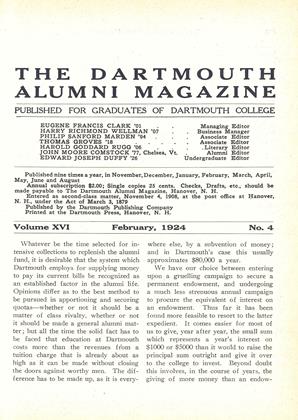In a unique poll being conducted by TheGranite Monthly to determine popular opinion as to the five leading persons in the life and thought of New Hampshire, President Ernest M. Hopkins, of Dartmouth, was recently reported as having a commanding lead.
Desiring to be impartial in the conduct of this project the magazine did not select the group of citizens whose opinion it would seek, but compiled a list of names furnished by the secretaries of some 15 state organizations, including the New Hampshire Manufacturer's Association, the farm bureau, the state grange, the state chamber of commerce, the Republican League, the bar and medical associations, the Federated Women's Clubs, the League of Women Voters, etc.
Following President Hopkins in the balloting are former Governor Robert P. Bass, Huntley N. Spaulding, and President Ralph D. Hetzel, of New Hampshire University. Following them, with about an equal number of votes, are George M. Putnam, John G. Winant, Senator Moses, Major Frank Knox, and Raymond B. Stevens. Women figuring prominently in the voting are Mary I. Wood, Mrs. Lillian Streeter, and Mrs. W. H. Schofield.
Commenting on the polling, the New YorkTimes remarked: "The result of the referendum so far has been more than a little curious. President Hopkins of Dartmouth is hopelessly ahead. President Hetzel of the University of New Hampshire is fourth. Two politicians, former Governor Bass and Mr. Huntley N. Spaulding, are second and third, respectively. To the worider of outlanders—of natives, too, perhaps—Senator Moses and Colonel Frank Knox of the Manchester Union, both as good as they are beautiful, are tied for fifth place.
It is easy to understand this equality of merit and distinction. How could any thoughtful man give preferences to one above the other? What puzzles sociologists is the popular recognition of college Presidents in New Hampshire. President Hopkins' strong and salient qualities have impressed themselves on the country as well as on the numerous and hardy and capable sons of Dartmouth. Doubtless President Hetzel, less renowned outside the land of the mountain and the rock, is fairly illustrious within it; but isn't this liking for college Presidents "a disquieting symptom?"
They have their merits and their uses, but, as a class, don't they belong among the scientific, and if not, the literary, fellows comminated so memorably by an old-school Pennsylvania statesman? As was asked when Noah was a sailor, "Whither are we drifting?"
 View Full Issue
View Full Issue
More From This Issue
-
 Article
ArticleWhatever be the time selected
February 1924 -
 Article
ArticleDARTMOUTH IN THE SEVENTIES
February 1924 By Samuel L. Powers '74 -
 Article
ArticleDARTMOUTH JOTTINGS OF A SOMEWHAT DESULTORY READER
February 1924 By Fred Lewis Pattee '88 -
 Class Notes
Class Notes$1000 REWARD PEARL NECKLACE
February 1924 -
 Article
ArticleHARRY HARMON BLUNT
February 1924 By Thomas Dreier -
 Article
ArticleFROM THE UNDERGRADUATE CHAIR
February 1924







